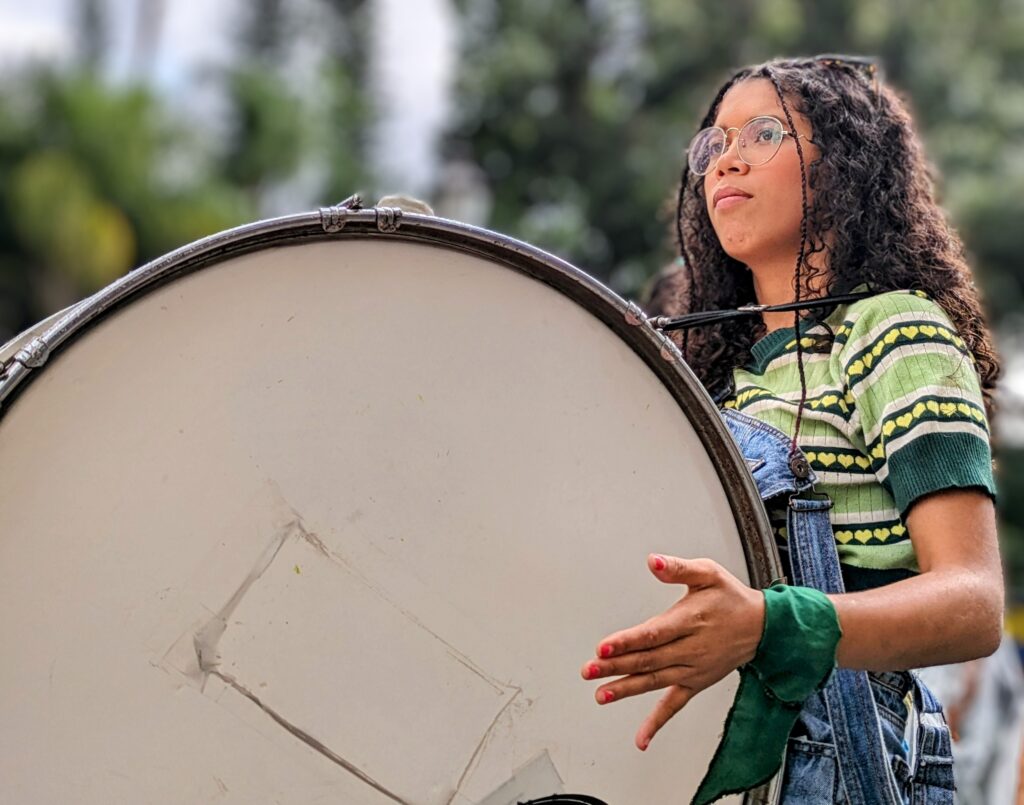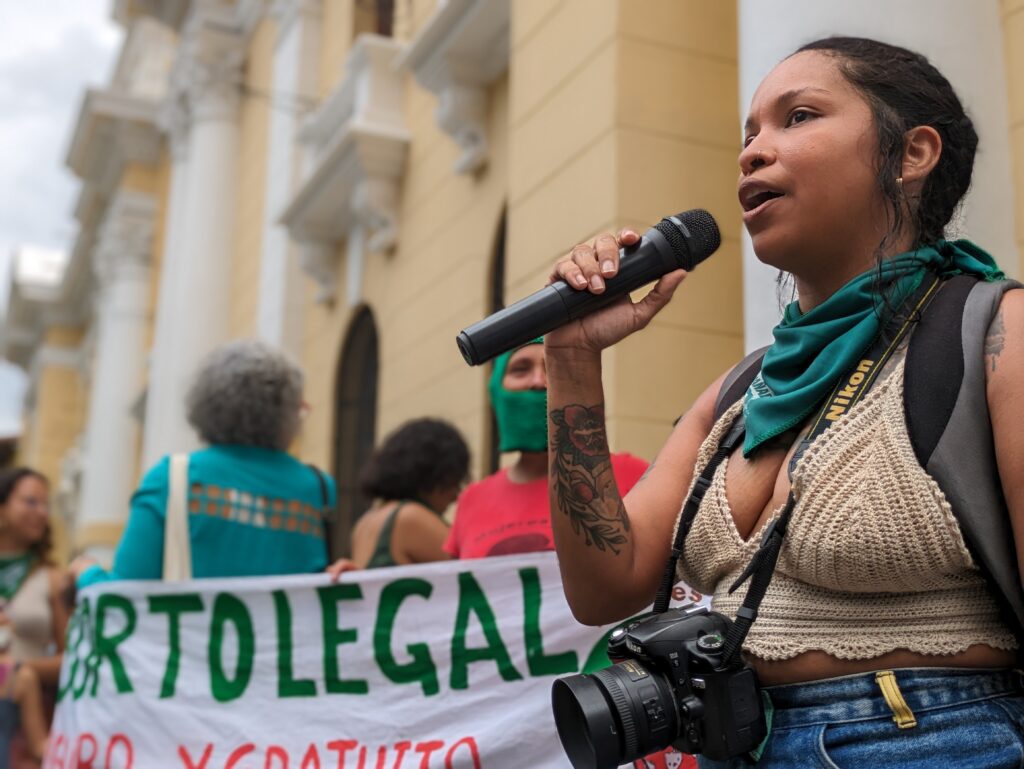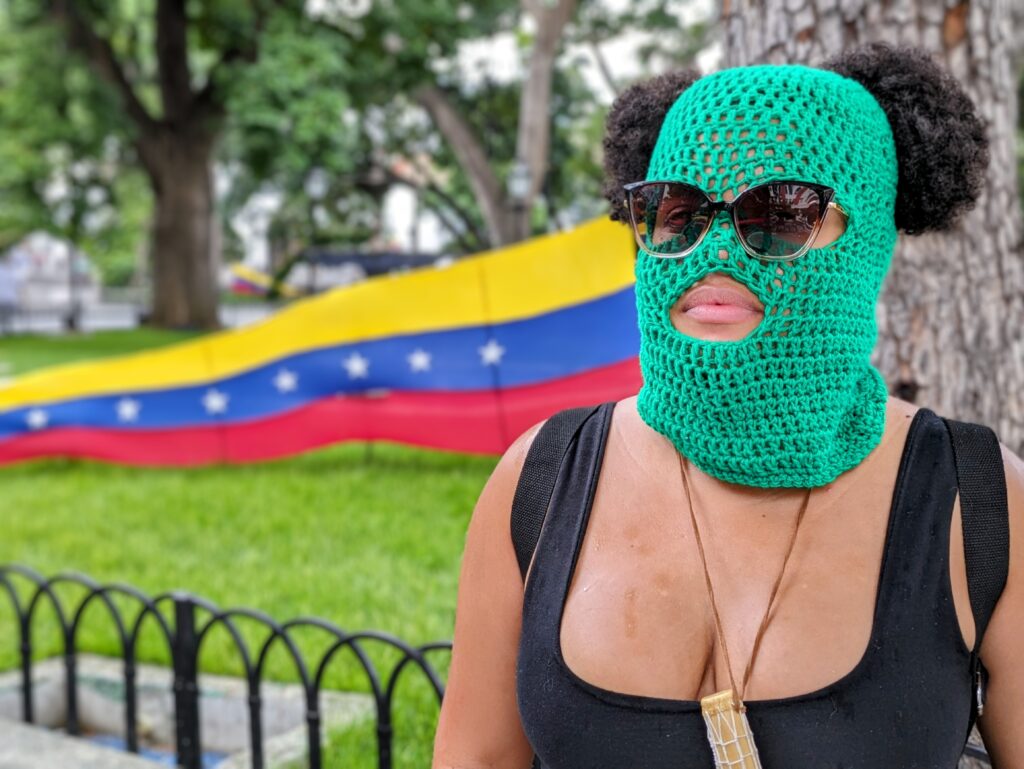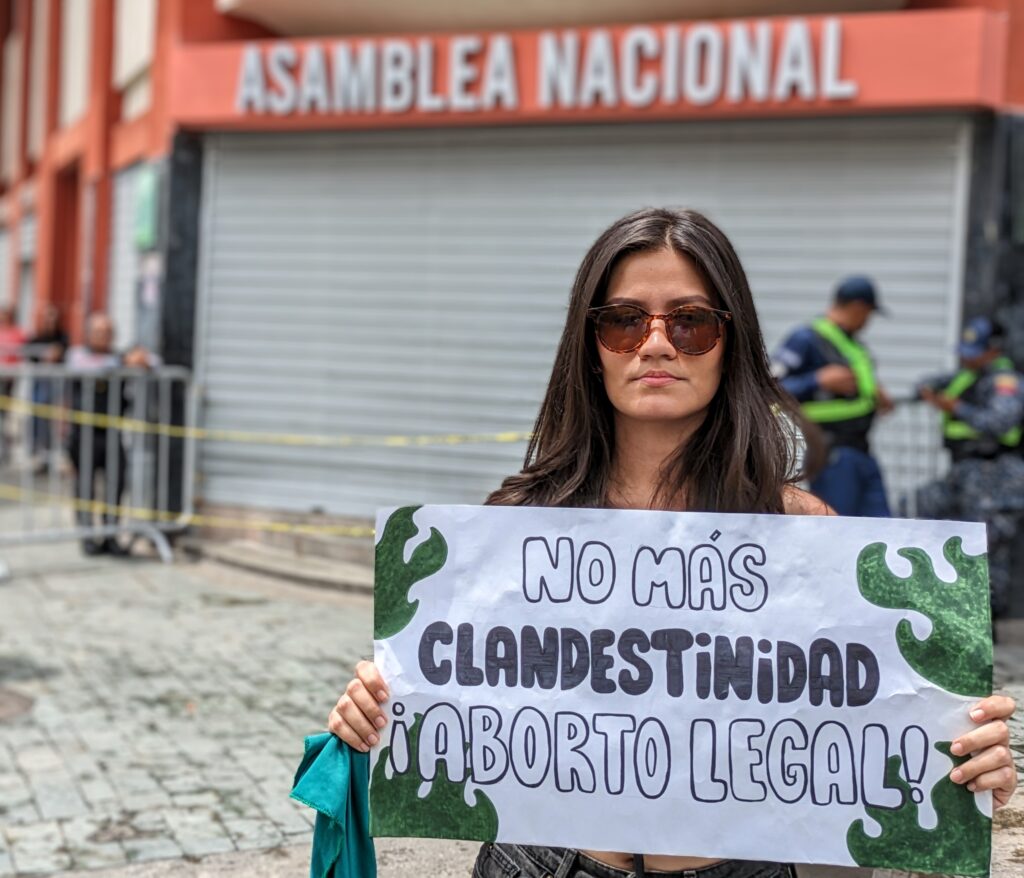Venezuelan Women Fight for Sexual and Reproductive Rights Amid a Humanitarian Crisis
The country has one of the most restrictive laws in the region while girls and women are particularly affected by scarcity, inflation and violence


Ruta Verde rallying outside the Assembly.
In recent years, the Green Wave movement has swept over Latin America, demanding the legalization and decriminalization of abortion. While it started in Argentina in 2018 –when feminists used the white scarfs traditionally worn by the anti-dictatorship Mothers of the Plaza de Mayo as an inspiration, but changing them to green due to the color being nonpartisan– the movement has been pivotal in achieving the decriminalization of abortion to different degrees in countries like Argentina, Mexico and Colombia. In Venezuela, the Green Wave arrived in 2021. Renamed as Ruta Verde (Green Route), it was supported by grassroots-feminist organizations, more than 25 local NGOs and more than a dozen of independent activists.
On September 28th, Ruta Verde called for a protest in front of the National Assembly (AN), in Caracas, joining the global events of 2023 International Safe Abortion Day. More than 200 people gathered from 9:00 am to almost 2:00 pm, chanting, haranguing and performing different forms of artivism. The demonstration denounced Venezuela’s criminalization of abortion, which is not only one of the most restrictive in Latin America and the Caribbean but it also occurs amid a complex humanitarian emergency that has become protracted, in which access to contraception and pre and postnatal care face significant barriers while adequate sex education programs are lacking. Similarly, these abortion restrictions often disproportionately affect marginalized communities and women living in poverty.
Historically, Latin and Caribbean women have been leading fighters for sexual and reproductive rights, especially the decriminalization of abortion. It was us who chose the 28th of September as the Regional Safe Abortion Day, during the Fifth Feminist Conference of Latin America and the Caribbean, held in Argentina in 1990, which then became the International Safe Abortion Day in 2011. One can conclude that this is a direct response against the machismo that has pervaded the region for centuries, making it the region that is the “most dangerous for women” and has the second highest teenage pregnancy rates in the world. It is no surprise then, that even the International Day for the Elimination of Violence against Women has its origins in the First Feminist Conference of Latin America and the Caribbean, held in Colombia in 1981.
However, the fight for the decriminalization of abortion in Venezuela has been going on for more than four decades.
Back in 1982, the Venezuelan Medical Federation requested before Congress the decriminalization of abortion for therapeutic reasons, pregnancies resulting from sexual rape and congenital malformations that make a fetus incompatible with life. 1984, 2004, 2005, 2007, 2008, 2010 and 2018 also saw unsuccessful attempts of reforming the Criminal Code and even the Constitution.
As of 2023, besides a few modifications from the early 2000s, the law that criminalizes abortion in Venezuela hasn’t changed since the early 20th century. Abortion remains criminalized in all its forms, except when the life of the woman already giving birth is in danger. Thus, the Ruta Verde protesters congregated at the AN on a Thursday, one of the two weekdays in which the Assembly is supposed to session.

Nevertheless, the lawmakers choose not to work this Thursday, something the feminists called “an act of cowardice.” As such, the protest was carried on in front of the lone Capitol building, with members of the National Bolivarian Police (PNB) and the Bolivarian Intelligence Service (SEBIN) overseeing the grounds. The activists chanted “machista government, oppressive government, you all defend women on television only”.
One woman in the protest stated: “It’s either a pack of birth control pills or a few grams of cheese to eat”.
On September 28th, 2022, some lawmakers of the AN received a delegation from Ruta Verde and stated that they would create a commission for “the discussion and presentation of the proposal for an Organic Law on Sexual and Reproductive Rights”. However, this project never came to be and with the cancellation of the parliamentary session this year, many feminists called it all “a farce.”
During the speeches of this year’s protest, it was highlighted how Venezuela’s protracted crises affect women differently. They are the first to restrict their food consumption in order to give it to their husband and children. Many also abandon their studies. According to the latest ENCOVI survey, the crisis has led to only 32,9% of women in Venezuela joining the workforce.
The lack of access to free contraceptives was also mentioned in the rally: facing an 80% shortage according to UNFPA and incredibly expensive prices when found. One woman in the protest stated: “It’s either a pack of birth control pills or a few grams of cheese to eat”.
Likewise, the collapse of the health system has meant an exponential increase in maternal and infant mortality rates.
“When I was 18, I gave birth to a planned and loved baby, who then died at 13 months old because in the public hospital where she was admitted there wasn’t an electric ventilator”, said Mima Cortez, an antiracism artist and activist. “That is motherhood in Venezuela.” Cortez also said she was in the protest because “those who are going to give birth or those who are giving birth want to guarantee a dignified life for themselves and their children.”

It is also essential to recognize that the challenges faced concerning reproductive rights are not experienced uniformly across all Venezuelans. Factors such as race, ethnicity, education level, socioeconomic status mix with gender to compound the barriers faced by marginalized communities.
“Afro-Venezuelan women are in the favelas, in vulnerable areas, in rural areas, with few economic resources and access to education”, said a member of Afra Venezuela, an antiracist and feminist organization: “That is why for us the slogan of ‘legal, safe and free abortion’ is important. ‘Free’ and ‘accompanied’ is what will guarantee that Afro-Venezuelan women truly have access to it.” An intersectional approach is vital, she says, because “abortion is also an ancestral memory of Afro and indigenous communities” in Venezuela who practiced it “as to not continue bringing enslaved people into the world.”

A truly comprehensive legalization of abortion should also include sexual education and the ability to afford contraceptives, as Venezuela has the third highest adolescent pregnancy rate in the region.
According to a 2022 study by advocacy group Avesa, 8 out of 10 teenagers between 10 and 14 years old in the most populated municipalities of the states of Sucre, Táchira and Apure have been pregnant, 7 out of 10 have children, and only 3 out of 10 women of reproductive age use contraceptives.
It’s clear abortion should be the last –but not least– step of sexual and reproductive rights. As the protesters chanted: “sexual education to decide, contraceptives to avoid abortion, legal abortion to avoid dying”.
“Comprehensive sexuality education is important in schools because it provides young people with the tools to make informed decisions about sexuality”, Jhoana Chiniros, a young activist, said, “I’m worried about the number of girls who become mothers and who are unable to continue with their studies. This creates a gap, limiting the personal and professional development of our girls.”
According to a 2022 study by advocacy group Avesa, 8 out of 10 Venezuelan teenagers between 10 and 14 years old have been pregnant, 7 out of 10 have children, and only 3 out of 10 women of reproductive age use contraceptives.
The prohibition on abortion is also used to criminalize and stigmatize not only the women who have had induced abortions, but also those who have suffered miscarriages. María Luisa Campos, General Coordinator of Resonalia, denounced that in 2022 she had a miscarriage and that she was “alone, for more than eight hours in a public hospital, drenched in blood and terrified.” Campos had a takeout box full of blood clots from her body because the doctors had told her they needed to “analyze them because they had to know if I did it myself.” According to Campos, only one doctor touched her the whole time and she was accompanied “because she didn’t like being alone with people like me.”

The criminalization of abortion has profound consequences not only for the physical well-being of women, but also for their mental health. When abortion is criminalized, women who seek to terminate their pregnancies often face desperate situations. They may turn to unsafe methods or unqualified individuals, leading to serious health complications or even death. In 2021, 24-year-old Fexsibel Bracho died after an unsafe abortion using a wire coat hanger, leaving three young children orphaned.
The fear of prosecution and social stigma associated with illegal abortions can exacerbate feelings of guilt, shame, and anxiety, causing significant mental distress. Additionally, those who experience miscarriage may also suffer tremendously due to the legal implications surrounding their loss.This goes way beyond the scope of political ideologies: it’s a public health issue. One woman cried “feminisms come from the left, the right, and the center”. We all know at least one woman who has had an abortion, whether she chose to tell us or not. It’s time we take action.
Caracas Chronicles is 100% reader-supported.
We’ve been able to hang on for 22 years in one of the craziest media landscapes in the world. We’ve seen different media outlets in Venezuela (and abroad) closing shop, something we’re looking to avoid at all costs. Your collaboration goes a long way in helping us weather the storm.
Donate




